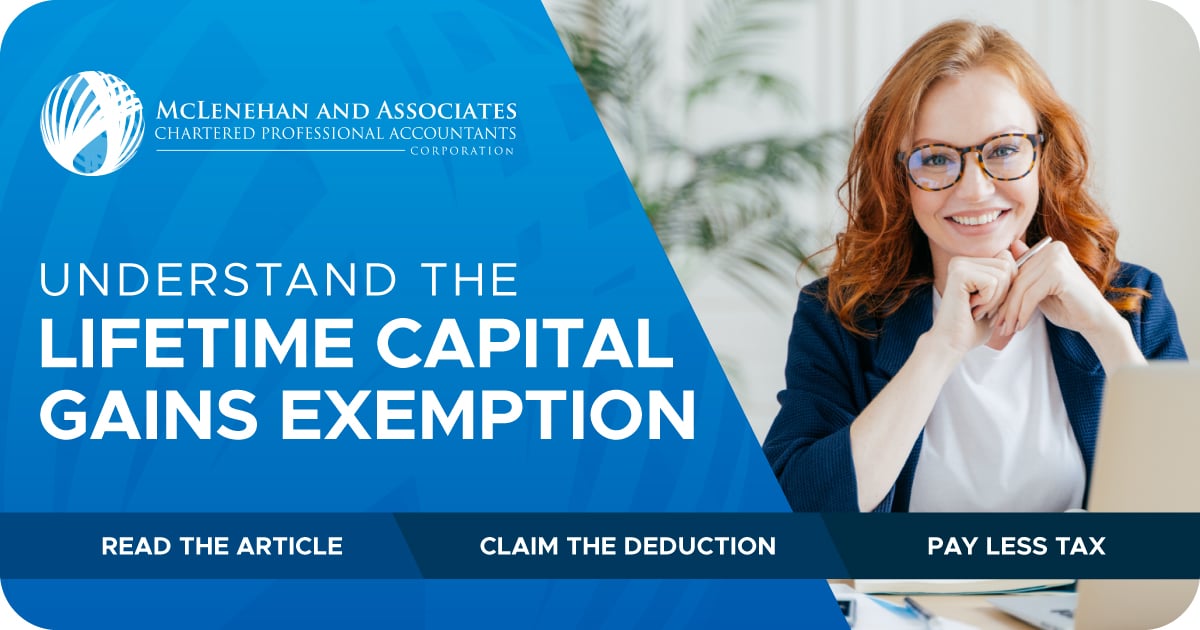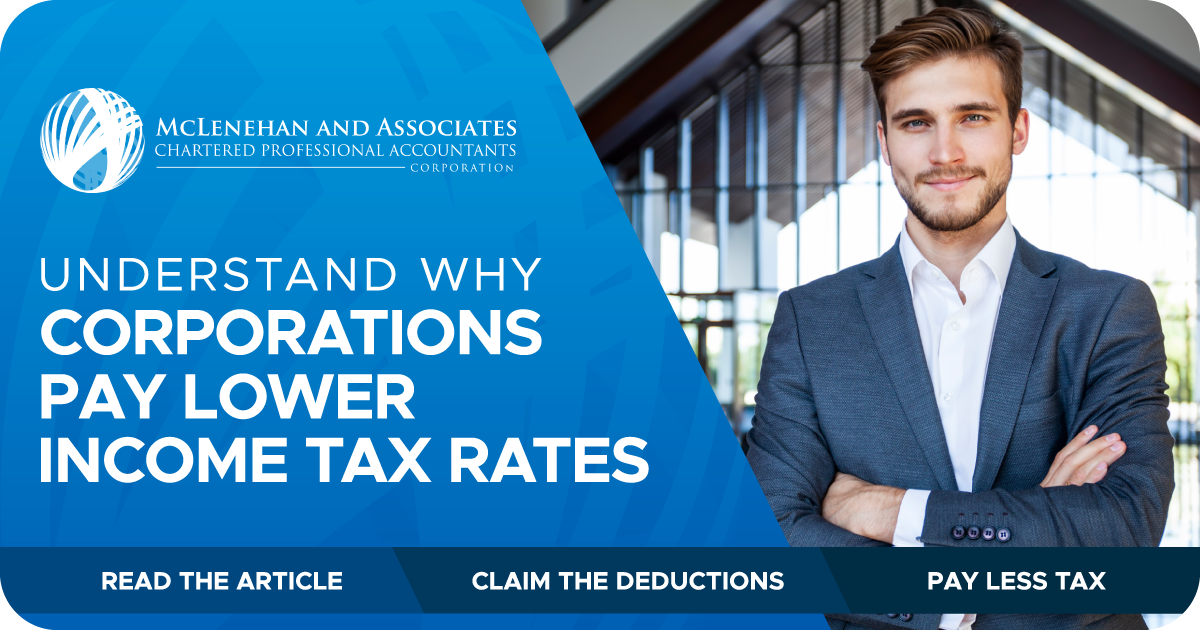Why do corporations pay lower tax rates?
Small businesses in Canada pay very low rates of tax on their income. That’s a positive thing, because after submitting your tax return, that extra...

The Lifetime Capital Gains Exemption (LCGE) allows Canadian incorporated small business owners to claim a deduction when selling shares of a corporation that can effectively eliminate the taxes realized on a sale of their business.
Capital gains can include profits from the sale of property, business shares, stocks, bonds, and other valuables. However, the LCGE only applies to specific assets. It provides an exemption for small business corporation owners who sell shares of their company. It allows them to keep the profits from qualifying sales — up to a certain amount — so that they can use the money for retirement, future investments, or to create an estate for inheritance purposes. Under current Canadian tax law, 50% of the capital gains made from such a sale would normally be taxable.
While this exemption can be beneficial for small business owners, it has a specific list of requirements that each shareholder needs to meet in order to qualify.
If you are a small business owner in Canada, here is what you need to know about the LCGE.
The rules for capital gains exemption are specific. They are meant to ensure that people who take advantage of this exemption are Canadian residents who run active small business corporations in Canada.
Individuals qualify for this tax exemption, but only if they earn their capital gains from the sale of a Qualified Small Business Corporation (QSBC).
A QSBC needs to meet three criteria:
In addition to individuals, ownership partnerships, and relatives of owners, holding corporations, family farms, and fishing operations can also qualify for LCGE status. However, all these entities need to meet the same three QSBC requirements.
All individuals who apply for an LCGE must be residents of Canada for the entire tax year in which they claim the exemption.
Small business owners can use several strategies to ensure that they meet the requirements necessary for LCGE qualification.
One step could be to "purify" the business by selling or changing passive investments into active income-generating assets to meet the 50% and 90% asset requirements. Passive assets include investment property that isn't used as part of a business operation.
Purification can mean selling these passive assets and reinvesting the profits in active business operations. An alternative would be to repurpose passive assets, such as turning an investment property into a retail location.
A more complex option is to "crystalize" the shares. This means that a business qualifies for LCGE, and the owner claims it before actually selling the shares. The value at the time of crystallization reestablishes a new and higher adjusted cost base of the shares. The owner retains their shares and receives the tax benefits they would have earned at the time of crystallization, even if the business does not qualify at the time of the actual sale.
It is possible to transfer passive assets to a separate holding company to meet the 50% and 90% activity requirements. However, taking this step may require the advice of an expert. When making such changes, a business owner needs to be sure they abide by the anti-avoidance rules outlined in the LCGE law.
Finally, if you operate a family-owned business with each member as a shareholder, the individuals can apply the LCGE separately for their respective shares. If the overall sale amount is above the limit (currently $913,630 in 2022 per individual), the tax benefits can at least stay within the family. This strategy can be useful if the small business is part of an inheritance or if the founder wants their children to benefit from the sale of the company.
Small business owners should seek the advice of an expert, such as a tax accountant, to help them navigate the qualification steps. Expert help is especially important for strategies like crystallization, which triggers specific rules about when an owner can sell their shares.
Currently, the Canada tax code calls for a tax on 50% of an individual's capital gains. Without an exemption, a small business owner would have to pay taxes on half of the profit that they earned from selling their company's shares. For example, someone who sold a company for $100,000 in profit would have to pay capital gains taxes on 50% (or $50,000) of that money.
The profit calculation takes the adjusted cost base into account. This figure is the amount the owner originally paid for the business plus any fees or additional costs. They subtract this, plus any additional fees or costs on the selling transaction, from the sales price to figure out the overall profit.
Without an exemption, the unprotected half of the capital gains get taxed at the marginal tax rate. Current combined federal and Manitoba tax rates range between 25% and 50.4%. The amount you have to pay on your capital gains depends on how much you earn in a given year and in which province you live.
For the 2022 tax year, the lifetime capital gains exemption is $913,630. However, since the government only counts 50% of this money as taxable capital gains, in practice, the amount of the deduction is $456,815. Farms and fishing corporations must meet the same criteria as other companies to be eligible for LCGE. However, the limits for these businesses are slightly higher. They qualify for a $1,000,000 exemption, which means they save up to $500,000 from capital gains taxes.
The total limit for LCGE is indexed annually in each of the most recent years to account for inflation. Though there is no guarantee that this approach will not change in the future, there is a good chance that small business owners who are beginning to prepare to sell in two years can expect slightly higher limits.
If an owner sells their business shares for less than $913,630, they can still apply the remaining amount under the limit at a later time. For example, if a company's shares sell for $400,000, the owner still has $513,630 worth of future capital gains that they can apply to the LCGE before reaching the limit.
On the other hand, if someone sells their small business corporation shares for $1,000,000, $86,370 of the sales price will be above the threshold, meaning that amount is subject to regular capital gains taxes without an exemption.
The process of claiming the LCGE can start two years before the actual sale of the small business.
The rules for claiming capital gains exemptions for the sale of a small business are well defined. However, there are nuances when it comes to issues like holding companies, meeting eligibility requirements, and distributing shares among family members. For these reasons, it is usually a good idea to enlist the help of a tax accountant to ensure you meet all requirements and get the maximum deduction allowed by tax law.

Small businesses in Canada pay very low rates of tax on their income. That’s a positive thing, because after submitting your tax return, that extra...

Do you use a home office for earning employment or business income? Claiming home office expenses on your tax return is going to reduce your taxable...

Small business owners can access capital through small business loans to help grow their business. But for their business to grow owners need to...